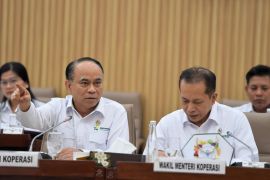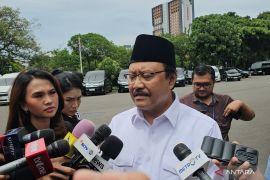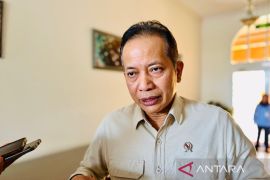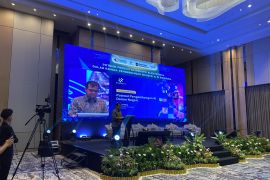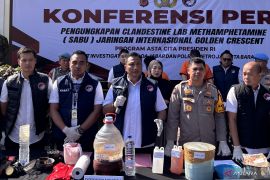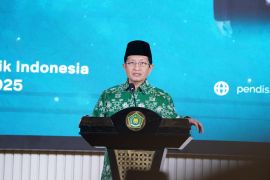The attack on Nagasaki came three days after American B-29 bomber Enola Gay dropped a bomb, dubbed "Little Boy", on Hiroshima, the first atomic bombing in history.Tokyo (ANTARA News/AFP) - Japan on Sunday marked the 70th anniversary of the atomic bombing of Nagasaki that claimed more than 74,000 lives almost instantly, in one of the final chapters of World War II.
Bells tolled and tens of thousands of people, including ageing survivors and the relatives of victims, observed a minutes silence at 11:02 am (0202 GMT), the exact moment the blast devastated the port city on August 9, 1945.
Prime Minister Shinzo Abe laid a wreath of flowers, with representatives from 75 countries, including US ambassador Caroline Kennedy, attending the ceremony.
"As the only country attacked with an atomic bomb in war, I am renewing our determination to lead the global effort of nuclear disarmament, to create a world without such weapons," Abe said in his speech.
Abe also said the country would continue to abide by its long-held non-nuclear principles: not producing, possessing or allowing nuclear weapons on Japanese territory.
He was criticised for failing to mention the three principles at a ceremony days earlier in Hiroshima, alarming atomic bomb survivors, particularly at a time when the nationalist leader is trying to push through legislation to expand the role of the military.
Nagasaki Mayor Tomihisa Taue appeared to implicitly criticise the bills in a speech at the ceremony.
"Worries and anxieties are now spreading among us that this pledge made 70 years ago and the principle for peace in the Japanese constitution may be now undermined," he said to loud applause.
Abe has faced criticism and opposition for his efforts to boost the role of his pacifist countrys Self-Defence Forces, changes that open the door to putting troops into combat for the first time since the war.
A constitution imposed by US occupiers after the war prevented Japans military from engaging in combat except in self defence.
Fat Man
In the now bustling port city of Nagasaki, about 74,000 people died in the initial blast near a major arms factory from a plutonium bomb dubbed "Fat Man", or from after-effects in the months and years following the bombing.
The attack on Nagasaki came three days after American B-29 bomber Enola Gay dropped a bomb, dubbed "Little Boy", on Hiroshima, the first atomic bombing in history.
Nearly everything around it was incinerated by a wall of heat up to 4,000 degrees Celsius (7,200 degrees Fahrenheit) -- hot enough to melt steel.
About 140,000 people are estimated to have been killed in the Hiroshima attack, including those who survived the bombing itself but later died from radiation sickness.
Gums bled, teeth fell out, hair came off in clumps; there were cancers, premature births, malformed babies and sudden deaths.
The twin bombings dealt the final blows to imperial Japan, which surrendered on August 15, 1945, bringing an end to World War II.
While some historians say that they prevented many more casualties in a planned land invasion, critics counter that the attacks were not necessary to end the war, arguing that Japan was already heading for imminent defeat.
At memorial ceremonies in Hiroshima on Thursday, Abe said Japan would submit a fresh resolution to abolish nuclear weapons at the UN General Assembly this year.
"We have been tasked with conveying the inhumanity of nuclear weapons, across generations and borders," he told the crowd.
This years memorials come days ahead of the scheduled restart of a nuclear reactor in southern Japan -- the first one to go back on line after a two-year hiatus following the tsunami-sparked disaster at Fukushima in 2011.
While Abe has pushed to switch reactors back on, public opposition remains high after the worst nuclear accident since Chernobyl in 1986.(*)
Editor: Heru Purwanto
Copyright © ANTARA 2015


